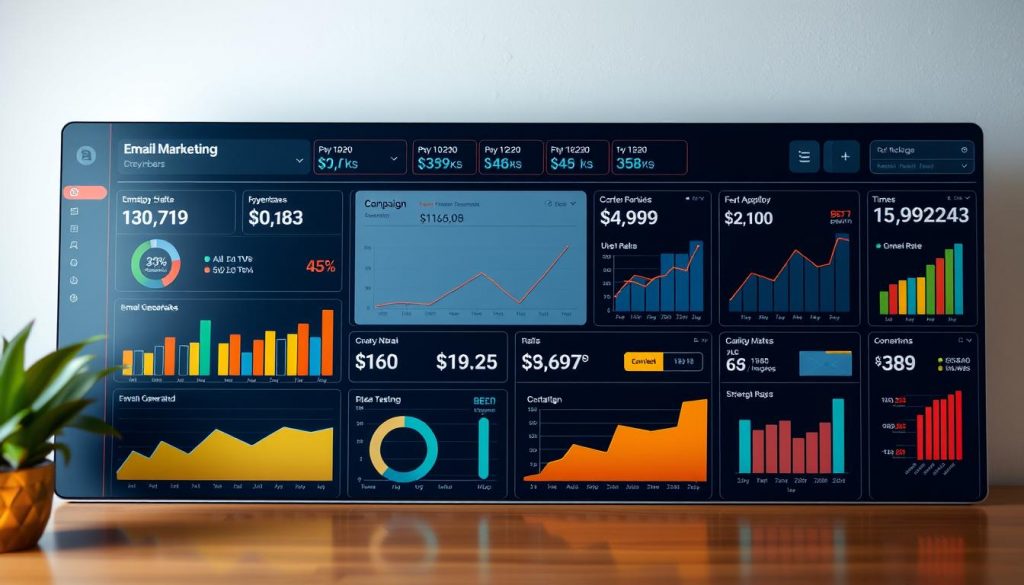In the competitive world of ecommerce, the right email marketing tools can be a game-changer. With so many options, picking the best email marketing software can feel daunting.
We’ve made a list of the top 10 email marketing software for ecommerce businesses. Our review will highlight the good and bad of each, helping you choose wisely.
Key Takeaways
- Top 10 email marketing software options for ecommerce businesses
- Pros and cons of each software
- Key features to consider when choosing email marketing software
- How to select the best software for your ecommerce needs
- Tips for effective email marketing campaigns
Why Email Marketing Is Essential for Ecommerce Success
In the competitive world of ecommerce, email marketing is a key strategy for businesses to stand out and increase sales. The right email marketing software for ecommerce helps companies reach and connect with their audience better.
ROI and Conversion Benefits
Email marketing is a high-ROI strategy for ecommerce businesses. Using best email marketing software for online stores, companies can make targeted campaigns. These campaigns can boost sales and conversions. Research shows that email marketing can give an average ROI of $42 for every $1 spent.
Customer Retention and Loyalty
Keeping customers is vital for ecommerce success. Email marketing solutions for ecommerce businesses help stay in touch with customers. This builds loyalty and encourages repeat buys. Regular newsletters and personalized offers keep customers engaged and coming back.
Personalization Opportunities
Personalization is essential in email marketing. With the right email marketing software for ecommerce, businesses can tailor messages for each customer. This personal touch boosts satisfaction and conversion rates. By using customer data, ecommerce businesses can make emails that feel personal and relevant.
Key Features to Look for in Email Marketing Software for Ecommerce
Finding the right email marketing software is key for ecommerce success. Look for certain features to make sure you pick the best one for your online store. These features will help your business grow.
Automation Capabilities
Email marketing automation is a big deal for ecommerce. It lets you create personalized customer journeys easily. Look for software with strong automation tools, like triggered emails and workflows, to make your marketing better.
Ecommerce Integration Options
It’s important for your email marketing software to work well with your ecommerce platform. Make sure it can connect with your current tools, like Shopify or WooCommerce. This way, you can use email marketing services for online retailers to their fullest.
Analytics and Reporting
To see how well your email marketing is doing, you need good analytics and reports. Choose software that gives you detailed stats on open rates, click-through rates, and conversion rates. This will help you improve your marketing plans.
Segmentation and Personalization Tools
Segmentation and personalization are essential for sending the right content to your customers. Pick email marketing software with advanced segmentation and personalization tools. This will help boost customer engagement and loyalty.
Comparison Table: Top10 Email Marketing Software for Ecommerce
Choosing the right email marketing software for ecommerce can be tough. That’s why we’ve made a comparison table of the top 10 options for ecommerce businesses.
| Email Marketing Software | Pros | Cons | Pricing | Ratings |
|---|---|---|---|---|
| Mailchimp | Easy to use, automation features | Limited ecommerce integrations | $0 – $299/month | 4.5/5 |
| Klaviyo | Advanced automation, ecommerce integrations | Steeper learning curve | $0 – $1,000/month | 4.8/5 |
| Omnisend | Multi-channel marketing, automation | Limited customization | $0 – $299/month | 4.6/5 |
| Constant Contact | User-friendly, excellent support | Higher pricing for advanced features | $20 – $335/month | 4.3/5 |
| Sendinblue | Affordable, SMS marketing | Limited templates | $0 – $66/month | 4.5/5 |
| GetResponse | Landing pages, webinars | Complex interface | $15 – $450/month | 4.4/5 |
| AWeber | Great customer service, easy to set up | Limited automation options | $19 – $149/month | 4.2/5 |
| ActiveCampaign | Powerful automation, CRM features | Can be overwhelming for beginners | $9 – $279/month | 4.6/5 |
| MailerLite | Simple interface, free plan available | Limited features in free plan | $0 – $50/month | 4.5/5 |
| ConvertKit | Ideal for creators, easy segmentation | Limited design options | $0 – $1,200/month | 4.4/5 |
Top 10 Email Marketing Software for Ecommerce Businesses
Choosing the right email marketing software is key for ecommerce success. There are many options, so pick one that fits your business needs and goals.

1. Mailchimp
Overview
Mailchimp is a well-known email marketing platform. It’s easy to use and has many features for ecommerce businesses. These include automation, personalization, and analytics.
Key Features
- Automation: Mailchimp’s automation lets you create targeted campaigns based on customer actions.
- Personalization: You can make your emails more personal using customer data and preferences.
- Analytics: It provides detailed analytics to track your campaign’s success.
Pros
- User-friendly interface: Easy to use, even for those not tech-savvy.
- Robust automation features: Supports complex automation workflows.
- Detailed analytics: Gives insights into how well your campaigns are doing.
Cons
- Limited ecommerce integrations: Integrates with some ecommerce platforms but not all.
- Customer support: Some users find it hard to get help when needed.
Pricing
Mailchimp has a free plan and paid plans starting at $9.99/month.
2. Klaviyo
Overview
Klaviyo is made for ecommerce businesses. It has advanced automation, personalization, and analytics for online stores.
Key Features
- Advanced automation: Klaviyo’s automation is customizable and works well with ecommerce platforms.
- Personalization: Offers advanced personalization based on customer behavior and data.
- Analytics: Provides detailed insights into campaign performance and customer behavior.
Pros
- Advanced automation: Highly customizable and integrates well with ecommerce platforms.
- Excellent personalization options: Allows for highly targeted campaigns.
- Detailed analytics: Offers insights into customer behavior and campaign performance.
Cons
- Steeper learning curve: Takes more time to learn and master.
- Pricing: Can be more expensive, mainly for larger businesses.
Pricing
Klaviyo’s pricing starts at $20/month for up to 500 contacts.
3. Omnisend
Overview
Omnisend is an email marketing automation platform for ecommerce businesses. It offers automation, personalization, and SMS marketing.
Key Features
- Automation: Offers advanced automation features including abandoned cart recovery.
- Personalization: Allows for personalization based on customer behavior and preferences.
- SMS marketing: Offers the ability to send SMS messages to customers.
Pros
- Advanced automation features: Includes features like abandoned cart recovery.
- SMS marketing capabilities: Allows for multi-channel marketing.
- User-friendly interface: Easy to navigate and use.
Cons
- Limited reporting: Some users find the reporting features not detailed enough.
- Pricing: Can become expensive as your list grows.
Pricing
Omnisend offers a free plan, with paid plans starting at $16/month.
4. Drip
Overview
Drip is an ecommerce CRM and marketing automation platform. It helps businesses automate their marketing efforts.
Key Features
- Automation: Offers advanced automation features including workflows and triggers.
- Personalization: Allows for personalization based on customer behavior and data.
- Analytics: Provides detailed insights into campaign performance.
Pros
- Advanced automation: Highly customizable and integrates well with ecommerce platforms.
- Excellent customer support: Known for responsive and helpful customer service.
- Detailed analytics: Offers insights into campaign performance and customer behavior.
Cons
- Steeper learning curve: Requires time to learn and master.
- Pricing: Can be expensive, mainly for larger businesses.
Pricing
Drip’s pricing starts at $19/month for up to 1000 subscribers.
5. ActiveCampaign
Overview
ActiveCampaign is a marketing automation platform. It offers email marketing, automation, and CRM features.
Key Features
- Automation: Offers advanced automation features including workflows and triggers.
- Personalization: Allows for personalization based on customer behavior and data.
- CRM: Includes a CRM to help manage customer relationships.
Pros
- Advanced automation: Highly customizable and integrates well with ecommerce platforms.
- Excellent CRM features: Helps in managing customer relationships effectively.
- Detailed analytics: Offers insights into campaign performance and customer behavior.
Cons
- Complex interface: Can be challenging to navigate for some users.
- Pricing: Can be expensive, mainly for larger businesses.
Pricing
ActiveCampaign’s pricing starts at $9/month for up to 500 contacts.
6. Constant Contact
Overview
Constant Contact is a well-established email marketing platform. It offers tools for creating and sending professional emails. It’s known for its ease of use and extensive template library.
Key Features
- Email templates and customization options
- Contact management and segmentation
- Tracking and reporting features
- Integration with ecommerce platforms
Pros
User-friendly interface: Easy to navigate, even for those without extensive email marketing experience.
Excellent customer support: Offers phone, email, and chat support.
Cons
Limited automation features compared to some competitors.
Pricing can become steep for larger contact lists.
Pricing
Constant Contact offers various pricing plans based on the number of contacts. Their plans start at $20/month for up to 500 contacts.
7. ConvertKit
Overview
ConvertKit is an email marketing tool designed for creators, including ecommerce businesses. It focuses on automation and personalization.
Key Features
- Advanced automation features
- Segmentation and tagging
- Customizable forms and landing pages
Pros
Advanced automation capabilities: Allows for complex email sequences based on subscriber behavior.
Excellent for ecommerce: Integrates well with ecommerce platforms and supports product recommendations.
Cons
Can be overwhelming for beginners due to its advanced features.
Pricing is based on the number of subscribers, which can increase costs.
Pricing
ConvertKit’s pricing starts at $29/month for up to 1,000 subscribers.
8. GetResponse
Overview
GetResponse is an all-in-one marketing platform. It includes email marketing, landing pages, and marketing automation.
Key Features
- Email marketing and automation
- Landing page creation
- Webinar hosting
Pros
Comprehensive marketing solution: Offers a wide range of marketing tools beyond email.
Conversion-focused features: Includes tools like landing pages and webinars to boost conversions.
Cons
The interface can be cluttered due to the numerous features.
Some users report that the email editor is not as intuitive as competitors.
Pricing
GetResponse offers various plans, with email marketing starting at $15/month for up to 1,000 contacts.
9. Sendinblue
Overview
Sendinblue is a versatile email marketing platform. It also offers SMS marketing and chat services.
Key Features
- Email and SMS marketing
- Marketing automation
- Transactional emails
Pros
Multi-channel marketing: Allows for both email and SMS marketing campaigns.
Flexible pricing: Offers a free plan and competitive pricing for paid plans.
Cons
The email editor can be slow at times.
Limited advanced features in the lower-tier plans.
Pricing
Sendinblue offers a free plan for up to 9,000 emails per month. Paid plans start at $25/month.
10. AWeber
Overview
AWeber is a well-established email marketing service. It provides tools for creating and sending emails.
Key Features
- Email creation and customization
- List management and segmentation
- Autoresponders and automation
Pros
Excellent customer support: Known for responsive and helpful customer service.
Reliable delivery: High deliverability rates ensure that emails reach subscribers’ inboxes.
Cons
The interface can feel dated compared to some competitors.
Limited advanced automation features.
Pricing
AWeber’s pricing starts at $19/month for up to 500 subscribers.
When choosing the right tool, consider your specific needs, such as automation capabilities, integration with your ecommerce platform, and customer support. Email Marketing Software for Ecommerce is a vital tool for online retailers, and selecting the right one can significantly impact your marketing success. By leveraging these top email marketing platforms for ecommerce, businesses can enhance their marketing strategies and drive growth. Email Marketing Software for Ecommerce is essential for creating targeted campaigns, and with the right tool, ecommerce businesses can achieve their marketing goals more effectively. Email Marketing Software for Ecommerce continues to evolve, providing more sophisticated tools for ecommerce businesses. By adopting the right email marketing software, ecommerce businesses can stay ahead of the competition.
How to Choose the Right Email Marketing Software for Your Ecommerce Store
Finding the right email marketing software is key for ecommerce success. With so many choices, picking the best one can be tough.
Assessing Your Business Needs
First, think about what your ecommerce business needs. Look at your customer base size, email campaign complexity, and automation needs. Email marketing software for ecommerce must meet your specific needs, like managing big subscriber lists or creating personalized customer paths.
Budget Considerations
Your budget is important when choosing email marketing software. Think about the monthly or yearly costs, plus any extra fees for features like automation or support. Ecommerce email marketing tools vary in price, so knowing your budget is key.
Scalability Factors
Your email marketing software should grow with your business. Look for software with flexible plans, easy upgrades, and handling more traffic and sales. Scalable email marketing software for ecommerce helps you manage your campaigns as your business grows.
By looking at these points, you can find an email marketing software for ecommerce that fits your needs, budget, and growth plans.
Implementing Effective Email Marketing Strategies for Ecommerce
Using the right email marketing strategies can really boost ecommerce sales. Email Marketing Software for Ecommerce is key. It helps automate, personalize, and optimize email campaigns.
Businesses should focus on a few key strategies with Email Marketing Software for Ecommerce. One top strategy is abandoned cart recovery. This targets customers who left items in their cart without buying.
Abandoned Cart Recovery
Abandoned cart recovery emails remind customers about items they left behind. With Email Marketing Software for Ecommerce, these emails can be automated. This increases the chance of turning abandoned carts into sales. A study found that timely abandoned cart recovery emails can greatly increase conversion rates.
Post-Purchase Follow-ups
Post-purchase follow-ups are another great strategy. These emails thank customers for their purchase and might offer related products. This boosts customer satisfaction and encourages them to buy again. Email Marketing Software for Ecommerce helps personalize these follow-ups, making them more effective.
Seasonal Promotions
Seasonal promotions are also vital for email marketing success. With Email Marketing Software for Ecommerce, businesses can create campaigns for holidays and special events. This takes advantage of the increased spending during these times.
| Email Marketing Strategy | Purpose | Benefits |
|---|---|---|
| Abandoned Cart Recovery | Remind customers of unfinished purchases | Increased conversion rates, reduced cart abandonment |
| Post-Purchase Follow-ups | Enhance customer satisfaction, encourage repeat business | Improved customer loyalty, possible increased sales |
| Seasonal Promotions | Take advantage of holiday and event-driven spending | More sales during busy times, better brand visibility |
Measuring Success with Email Marketing for Ecommerce
Measuring email marketing success is key for ecommerce businesses. They need to focus on several areas to understand how well their campaigns work. This helps them see how customers interact with their emails.
Key Performance Indicators
Key Performance Indicators (KPIs) are important for ecommerce businesses. They track things like open rates, click-through rates (CTR), conversion rates, and unsubscribe rates. By watching these, businesses can spot what needs work and make changes.
For example, a low open rate might mean the subject lines need a boost. But a high CTR shows the email content is hitting the mark.

A/B Testing Strategies
A/B testing is a great way to make email marketing better. It compares two versions of an email, changing just one thing. This helps businesses see which version works best.
This method lets ecommerce businesses tweak their strategies based on real customer feedback. It leads to better engagement and more sales.
Continuous Improvement
Keeping email marketing campaigns sharp is vital. This means always checking KPIs, doing A/B tests, and keeping up with email marketing trends. By doing this, ecommerce businesses can keep their email marketing fresh and effective.
Conclusion
Email marketing is key for ecommerce success. It boosts ROI, keeps customers coming back, and makes emails personal. The right email marketing software helps automate campaigns and track how well they do.
Top email marketing tools for ecommerce have cool features. They help automate, segment, and analyze data. When picking a tool, think about what you need, your budget, and how it will grow with your business.
Good email marketing strategies can really help your business. For example, sending emails to customers who left items in their cart or after they’ve made a purchase. With the right tools, you can make your email marketing better and grow your business.


